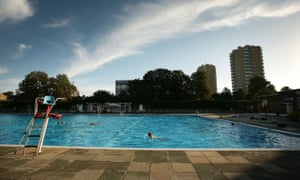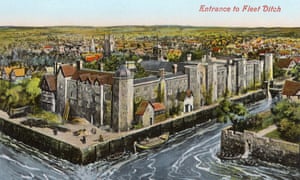Extract from The Guardian
Campaigners propose using buried rivers as source of fossil fuel-free heat
Boris Johnson’s team wanted to uncover them for Londoners. The Environment Agency explored turning them into wildlife paradises.
Now campaigners are targeting London’s lost rivers, water courses that have been gradually buried over the centuries, as a source of fossil fuel-free heat.
Rivers better known by the streets named after them – such the Fleet and the Strand – offer an inspiring way of cutting the capital’s emissions, the climate charity 10:10 and the social enterprise Scene said.
The refurbishment of Buckingham Palace, which includes plans for a new heating system and boilers, could be given a low-carbon boost by tapping the nearby Tyburn, according to an analysis by the groups.
The river could provide more heat than the palace uses even on the coldest day, they said.
The art deco Brockwell Lido in south London, meanwhile, could harness the heat in the adjacent river Effra. Extracting just a tenth of its energy would keep the pool – which dips to 2C in winter – warm all year round.
Another possibility highlighted by the groups is a new future-proofed heat network for four housing estates at Somers Town, north London, which could potentially one day draw heat from the river Fleet.

Now campaigners are targeting London’s lost rivers, water courses that have been gradually buried over the centuries, as a source of fossil fuel-free heat.
Rivers better known by the streets named after them – such the Fleet and the Strand – offer an inspiring way of cutting the capital’s emissions, the climate charity 10:10 and the social enterprise Scene said.
The refurbishment of Buckingham Palace, which includes plans for a new heating system and boilers, could be given a low-carbon boost by tapping the nearby Tyburn, according to an analysis by the groups.
The river could provide more heat than the palace uses even on the coldest day, they said.
The art deco Brockwell Lido in south London, meanwhile, could harness the heat in the adjacent river Effra. Extracting just a tenth of its energy would keep the pool – which dips to 2C in winter – warm all year round.
Another possibility highlighted by the groups is a new future-proofed heat network for four housing estates at Somers Town, north London, which could potentially one day draw heat from the river Fleet.

Leo Murray, the director of campaigns at 10:10, said: “The mayor has set ambitious targets for phasing out gas burning in London over the coming years and we are going to need every bit of low-carbon heat we can get our hands on to meet these goals.”
Water-source heat pumps, which in effect work as a reverse refrigerator, would be used to extract the heat.
This could in turn be sent to housing estates and large buildings via heat networks, which the government has been backing as a way to decarbonise heating.
However, the study made no assessment of whether the pumps would be financially viable for projects and they are yet to be used at scale in the UK.
The royal borough of Greenwich has been exploring the possibility of using water-source heat pumps to provide green heating for 100 homes at the refurbishment of the Ernest Dence estate but is still finalising its plans.

No comments:
Post a Comment